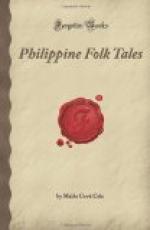Benito untied the cups, taking great care of them. He was about to leave, when the bird asked him to tarry long enough to bury it, as the places to which it had been were so far away that it was weary unto death.
Benito did not like to bury the bird, but he soon saw that it really was dying, so he waited; and when it was dead, he buried it, feeling very sorry over the loss of so helpful a friend.
He went back to the palace and delivered the two kinds of water to his master. The Princess then asked the King to cut her in two and pour the water from heaven upon her. The King was not willing to do it, so she did it herself, asking the King to pour the water. This he did, and, lo! the Princess turned into the most beautiful woman that ever the sun shone on.
Then the King was desirous of becoming handsome; so he asked the Princess to pour the other cup of water over him after he cut himself. He cut himself, and she poured over his body the water from the nether-world; but from him there arose a spirit more ugly and ill-favored than imagination could picture. Fortunately, it soon vanished from sight.
The Princess then turned to Benito, and said, “You have been faithful in your duties to your master, kind to me in restoring the jewels I lost, and brave in delivering me from the cruel giants. You are the man I choose for my husband.”
Benito could not refuse so lovely a lady. They were married amid great festivities, and became the king and queen of that broad and fertile land.
Benito gave his parents one of the finest portions of his kingdom, and furnished them with everything they could desire. From that time on they were all very happy,—so happy that the story of their bliss has come down through the centuries to us.
PART II
Visayan Folk-Tales.
Introduction.
These stories are intended to bring before the American public a few of the tales related by Visayan parents to their children, or by the public story-teller in the market, as the people gather to buy the material for the evening meal. It was only toward the close of a three years’ stay in the Islands, in one province, and in neighboring places, and after a fair acquaintance with Spanish and a little knowledge of the native dialect had enabled us to obtain a closer insight into the home life of our pupils than would otherwise have been possible, that we ventured upon the collection of these tales, hoping that they might prove of interest to people at home. Many of the stories were written by our boys and girls as part of their work in English composition. Others were prepared by the native teachers, some of whom had been well educated by the Spaniards and had already learned to write very fair English. Indeed, a few were able, at about the time that these stories were written, to pass the civil service examination for appointment as insular teachers. The articles on the superstitious beliefs of the people were prepared by one of these teachers, so that they might be as nearly correct as possible.




